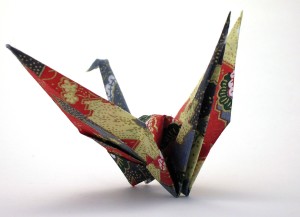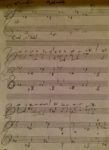Stepping Off The Page: Starting An Improv Vocabulary
 Stepping Off the Page is a monthly column written by Deanna Witkowski for Piano Addict.
Stepping Off the Page is a monthly column written by Deanna Witkowski for Piano Addict.
Have you ever thought about how little children will hum or sing melodies that they improvise on the spot? They might sing about something they’re doing at the moment, or sing without words. This is improvising.
Have you ever thought about how each time you have a conversation with another person, unless you have decided to limit your questions or answers to a set of preplanned multiple-choice phrases, you are improvising? You may have a strong idea of what you will say (perhaps you have practiced for an important conversation), or you may not- but nevertheless, in your conversation, you are improvising.
In this month’s edition of Stepping Off the Page, I want to offer a simple exercise that can be used by teachers and students. This exercise has two main purposes: first, to break through some of the fear that often surrounds improvising; and second, to help us to use our first instrument- our voice- to create singable melodies that we can later bring to the piano as starter vocabulary for piano improvisation.
EXERCISE: Introducing ourselves with our voices.
SINGING IN A CIRCLE- BEGINNING IMPROVISATION
In everyday life, we often introduce ourselves by answering questions such as, “What do you do?” “Where do you live?” When we reply, we are not just communicating the direct answers to these questions (i.e., “I am a musician.”—which almost always leads to more questions!; “I live in New York City.”). If we are answering these questions in person by speaking (and not via email or texting), we are communicating something about our personalities and our emotions simply because we are speaking in our one-of-a-kind voice. The timbre and inflections that we use often say more about who we are than do the actual words that we speak.
In our culture, which emphasizes information, we are taught that to have the right answers to questions is essential. If we fail by giving a wrong answer, we often fear disastrous consequences. I find that this same fear of not making a mistake is present in many musicians who want to improvise.
This exercise has no “right” or “wrong” answer (tell your students this upfront!). Here are two options for the exercise, depending on whether or not you have a single student, or a classroom of students:
- For groups: Have the group stand in a circle, so that everyone can see each other. Tell the students that each person will introduce herself by sharing her name and one thing that she would like the group to know about her- but that this introduction will be sung (the teacher demonstrates first) to the person to your right. Here’s a sung example:
So, the teacher sings her introduction to the person on her right; that person then sings back what the teacher sings, but changes the pronoun (i.e., “Your name is Deanna. You like to eat raspberries.”). This person then turns to the person on his right and introduces himself by singing a new introduction; the third person sings back (“Your name is…”) and introduces herself; etc.
This exercise allows the students to begin to build a level of trust with one another, something that is imperative for group improvisation. It also helps to remove the fear of singing or improvising in front of others.
- For private students: If you are teaching private lessons, you can adapt this exercise by simply having a short, sung conversation. It can begin with the “my name is….I like….” and can continue with questions addressed one to the other.
In the next edition of Stepping Off the Page, we’ll learn how to use the concept of “same, same, different” to create sung phrases within the 12-bar blues. We’ll then take these phrases and transfer them to the piano.
Deanna Witkowski is an active pianist and composer, has 5 albums to her credit, and currently holds the piano chair in the BMI/New York Jazz Orchestra. She won the Great American Jazz Competition in 2002. Deanna is passionate about improvising and is excited about this opportunity to connect with all of you. In this column she teaches and discusses improvisation in a broader context than just jazz and does it so all you piano addicts, no matter your level, can have some fun.


